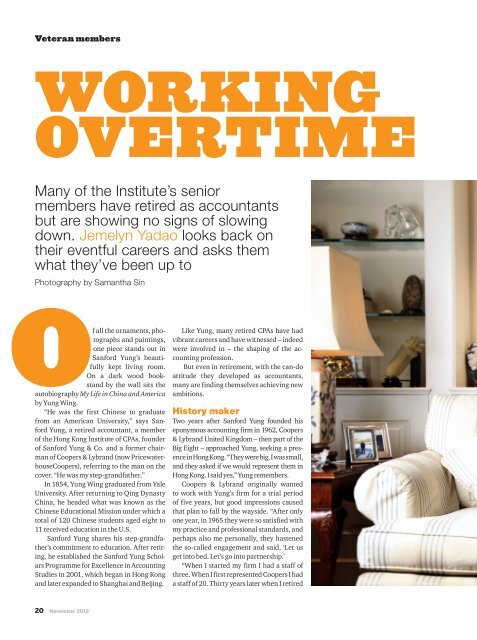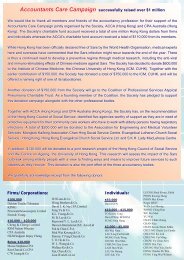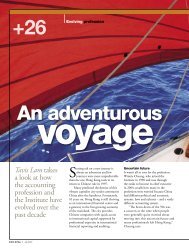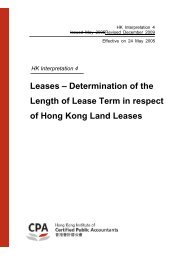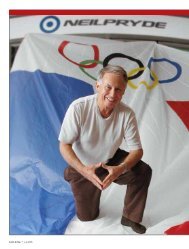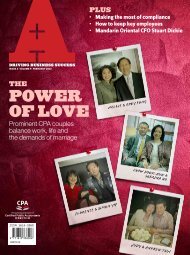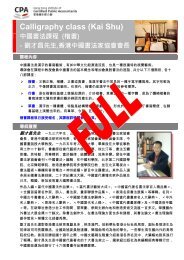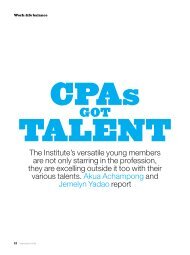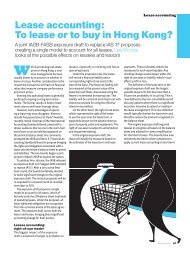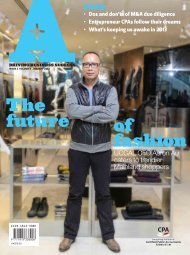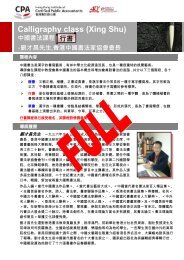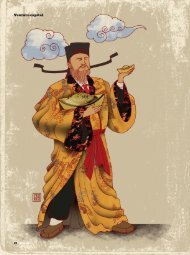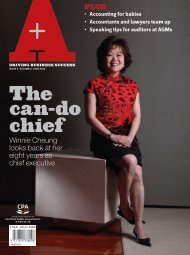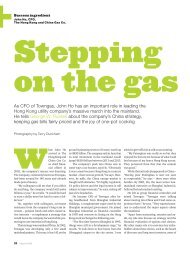Second wind - Hong Kong Institute of Certified Public Accountants
Second wind - Hong Kong Institute of Certified Public Accountants
Second wind - Hong Kong Institute of Certified Public Accountants
You also want an ePaper? Increase the reach of your titles
YUMPU automatically turns print PDFs into web optimized ePapers that Google loves.
Veteran members<br />
WORKING<br />
OVERTIME<br />
Many <strong>of</strong> the <strong>Institute</strong>’s senior<br />
members have retired as accountants<br />
but are showing no signs <strong>of</strong> slowing<br />
down. Jemelyn Yadao looks back on<br />
their eventful careers and asks them<br />
what they’ve been up to<br />
Photography by Samantha Sin<br />
f all the ornaments, photographs<br />
and paintings,<br />
one piece stands out in<br />
Sanford Yung’s beautifully<br />
kept living room.<br />
On a dark wood bookstand<br />
by the wall sits the<br />
autobiography My Life in China and America<br />
by Yung Wing.<br />
“He was the first Chinese to graduate<br />
from an American University,” says Sanford<br />
Yung, a retired accountant, a member<br />
<strong>of</strong> the <strong>Hong</strong> <strong>Kong</strong> <strong>Institute</strong> <strong>of</strong> CPAs, founder<br />
<strong>of</strong> Sanford Yung & Co. and a former chairman<br />
<strong>of</strong> Coopers & Lybrand (now PricewaterhouseCoopers),<br />
referring to the man on the<br />
cover. “He was my step-grandfather.”<br />
In 1854, Yung Wing graduated from Yale<br />
University. After returning to Qing Dynasty<br />
China, he headed what was known as the<br />
Chinese Educational Mission under which a<br />
total <strong>of</strong> 120 Chinese students aged eight to<br />
11 received education in the U.S.<br />
Sanford Yung shares his step-grandfather’s<br />
commitment to education. After retiring,<br />
he established the Sanford Yung Scholars<br />
Programme for Excellence in Accounting<br />
Studies in 2001, which began in <strong>Hong</strong> <strong>Kong</strong><br />
and later expanded to Shanghai and Beijing.<br />
20 November 2012<br />
Like Yung, many retired CPAs have had<br />
vibrant careers and have witnessed – indeed<br />
were involved in – the shaping <strong>of</strong> the accounting<br />
pr<strong>of</strong>ession.<br />
But even in retirement, with the can-do<br />
attitude they developed as accountants,<br />
many are finding themselves achieving new<br />
ambitions.<br />
History maker<br />
Two years after Sanford Yung founded his<br />
eponymous accounting firm in 1962, Coopers<br />
& Lybrand United Kingdom – then part <strong>of</strong> the<br />
Big Eight – approached Yung, seeking a presence<br />
in <strong>Hong</strong> <strong>Kong</strong>. “They were big, I was small,<br />
and they asked if we would represent them in<br />
<strong>Hong</strong> <strong>Kong</strong>. I said yes,” Yung remembers.<br />
Coopers & Lybrand originally wanted<br />
to work with Yung’s firm for a trial period<br />
<strong>of</strong> five years, but good impressions caused<br />
that plan to fall by the wayside. “After only<br />
one year, in 1965 they were so satisfied with<br />
my practice and pr<strong>of</strong>essional standards, and<br />
perhaps also me personally, they hastened<br />
the so-called engagement and said, ‘Let us<br />
get into bed. Let’s go into partnership.’<br />
“When I started my firm I had a staff <strong>of</strong><br />
three. When I first represented Coopers I had<br />
a staff <strong>of</strong> 20. Thirty years later when I retired
“I said, ‘I’m the only partner and<br />
you allow my staff below me, an<br />
Englishman, to look at the minute<br />
books and not me? I don’t want the<br />
job.’ So I thanked him and left.”<br />
Sanford Yung<br />
November 2012 21
Veteran members<br />
from practice I had a staff <strong>of</strong> 750. So the expansion<br />
was quite rapid and quite gratifying,”<br />
recalls Yung, who became chairman <strong>of</strong><br />
Coopers & Lybrand <strong>Hong</strong> <strong>Kong</strong> in 1965.<br />
Of course, the rapid growth <strong>of</strong> the firm<br />
meant Yung had to deal with many challenges.<br />
He recalls one in particular involving the<br />
1959 purchase <strong>of</strong> Mercantile Bank by the<br />
<strong>Hong</strong>kong and Shanghai Banking Corporation.<br />
In 1965, Mercantile moved its head<br />
<strong>of</strong>fice from the U.K. to <strong>Hong</strong> <strong>Kong</strong> and was<br />
jointly audited by Peat Marwick Mitchell<br />
(now known as KPMG) and Coopers & Lybrand.<br />
An invitation to meet with a man<br />
named Freddie Knightly from Mercantile<br />
Bank in <strong>Hong</strong> <strong>Kong</strong> led to Yung sitting in an<br />
uncomfortable meeting.<br />
Knightly reminded Yung that Mercantile<br />
was now a subsidiary <strong>of</strong> <strong>Hong</strong>kong and<br />
Shanghai Banking Corporation, alluding to<br />
the parent bank’s policy <strong>of</strong> allowing only expatriates<br />
into the secrets <strong>of</strong> its financial records.<br />
“I said, ‘I’m the only partner and you<br />
allow my staff below me, an Englishman, to<br />
look at the minute books and not me? I don’t<br />
want the job.’ So I thanked him and left.”<br />
Half an hour after Yung got back to his<br />
<strong>of</strong>fice, he received a call from Knightly.<br />
“Knightly said: ‘You win. You can certainly<br />
look at our private books.’<br />
“I accepted it on those terms and became<br />
the first Chinese in the then 75-year history<br />
<strong>of</strong> Mercantile Bank to sign their secrecy<br />
book – a book directors and auditors must<br />
sign vouching that you would not divulge<br />
anything you see,” says Yung. “I stood up for<br />
the Chinese in my pr<strong>of</strong>ession <strong>of</strong> which I am<br />
extremely proud. I made it a point to raise<br />
the standard <strong>of</strong> my pr<strong>of</strong>ession.”<br />
Although the Sanford Yung Scholars Programme<br />
is now fully sponsored by PwC, his<br />
interest in the charity’s work remains strong.<br />
“The main purpose <strong>of</strong> the scholarship is to<br />
recognize and encourage good students [in<br />
accounting],” Yung explains. “We send students<br />
from <strong>Hong</strong> <strong>Kong</strong> to do internships in<br />
PwC London. And those from Shanghai and<br />
Beijing we second to New York for internship.<br />
This is very meaningful.”<br />
Yung is also chief donor to the Sir Edward<br />
Youde Memorial Fund, which was<br />
established in 1987 in memory <strong>of</strong> the governor<br />
<strong>of</strong> <strong>Hong</strong> <strong>Kong</strong> between 1982 and 1986,<br />
who died suddenly on a visit to Beijing.<br />
“Two days after his death I sent HK$1 million<br />
to start the memorial fund and now every<br />
year I contribute money,” he says.<br />
The fund, which bestows fellowships,<br />
22 November 2012<br />
scholarships and education awards to outstanding<br />
students in <strong>Hong</strong> <strong>Kong</strong>, has contributed<br />
about HK$21 million to nearly 600,000<br />
students over 25 years, says Yung. “The parents<br />
<strong>of</strong> those young awardees are so grateful<br />
they come with their son or daughter with<br />
tears in their eyes to collect the prize.”<br />
Getting China on track<br />
Nellie Fong remembers her education in accounting<br />
being somewhat different to the<br />
programmes students experience today.<br />
As part <strong>of</strong> her training, the now retired <strong>Institute</strong><br />
member and former chairman <strong>of</strong> PwC’s<br />
China operations, did two things: adding all<br />
the numbers in a telephone directory and<br />
going to the supermarket to calculate total<br />
costs at the till using mental arithmetic.<br />
“At that time in England, 12 pence<br />
equalled one shilling and 20 shillings<br />
equalled one pound… I would stand by the<br />
screen and add in my head and at the end I
should know exactly how much it would say<br />
on the receipt. I was as good as that.”<br />
While doing long additions became second<br />
nature to Fong, a trip to newly opened China<br />
wasn’t as easy. Fong, who joined Arthur Andersen<br />
in 1973, volunteered to go to the Mainland<br />
in the 1980s to set up an <strong>of</strong>fice for the firm<br />
and was faced with a list <strong>of</strong> difficulties.<br />
“The laws and rules were not in order and<br />
you couldn’t hire your own people because<br />
the Chinese government controlled employ-<br />
Nellie Fong<br />
ment agencies. Everything was very difficult,”<br />
Fong remembers. “The hardest part<br />
was we were losing money because there<br />
were no jobs and no work. Every year I had<br />
to explain to management why we were not<br />
making money and appear before the board<br />
to explain that it wasn’t an expense, it was<br />
an investment.”<br />
Eventually, the firm built up a roster <strong>of</strong><br />
clients made up <strong>of</strong> foreign multinational<br />
companies investing in China.<br />
A PLUS<br />
Fong’s decision to pursue her career in<br />
the Mainland changed her life in more ways<br />
than one. After being a member <strong>of</strong> the <strong>Hong</strong><br />
<strong>Kong</strong> Legislative Council from 1988 to 1991,<br />
Fong was appointed by the Chinese government<br />
as a <strong>Hong</strong> <strong>Kong</strong> adviser for the preparatory<br />
committee on the territory’s transfer <strong>of</strong><br />
sovereignty to China. It was during this time<br />
that Fong devised a project that she holds<br />
dear to her heart to this very day. “Provinces<br />
in China were planning on giving us a gift to<br />
mark the occasion so I felt that <strong>Hong</strong> <strong>Kong</strong><br />
should give back to China,” she recalls. “I<br />
came up with a hospital built on a train.”<br />
“We are now training<br />
local doctors to do<br />
cataract operations<br />
and setting up<br />
cataract centres in<br />
local hospitals.”<br />
Fong founded the charity project Lifeline<br />
Express – a train-mounted eye hospital that<br />
travels to remote areas <strong>of</strong> China to provide<br />
free operations to blind cataract patients. It<br />
launched on 1 July 1997, the day <strong>Hong</strong> <strong>Kong</strong><br />
returned to Chinese sovereignty.<br />
With around five million cataract patients<br />
in China and an increase <strong>of</strong> 500,000<br />
patients each year, Fong is working to expand<br />
the reach <strong>of</strong> her trains. “We are now<br />
training local doctors to do cataract operations<br />
and setting up cataract centres in local<br />
hospitals. We call it a Lifeline Express train<br />
that never leaves,” she says.<br />
Fong, who in 2008 received a Global<br />
Initiative Award from former U.S. President<br />
Bill Clinton for her charity work, now<br />
has four trains, 15 training facilities and 17<br />
cataract centres. Rather than using her time<br />
in retirement to <strong>wind</strong> down, she is fully engaged<br />
with the charity’s work, addressing<br />
issues such as the lack <strong>of</strong> senior eye doctors<br />
in China. “I went all over the world, appealed<br />
to international experts to come to<br />
China and help... That’s why I’m very busy.<br />
I’m retired from my accounting career yet<br />
found something very worthwhile.”<br />
Man <strong>of</strong> the match<br />
Taking orders for tea, c<strong>of</strong>fee and sandwiches<br />
was just one <strong>of</strong> T. Brian Stevenson’s duties<br />
while working for an audit group, fresh out<br />
<strong>of</strong> university in Scotland. “It was a masterservant<br />
relationship, that’s how it was,” re-<br />
November 2012 23
Veteran members<br />
“The club’s charity trust is just an amazing<br />
organization. Our donations last year<br />
reached a record high <strong>of</strong> HK$1.73 billion<br />
in one year. To be involved in it, I regard it<br />
as a serious privilege.”<br />
calls Stevenson, a past <strong>Institute</strong> president, a<br />
veteran tax accountant and the chairman <strong>of</strong><br />
the <strong>Hong</strong> <strong>Kong</strong> Jockey Club. “Maybe we had<br />
a longer learning path,” he ponders. “Nowadays<br />
you might be thrown straight into the<br />
deep end.”<br />
When Stevenson first moved to <strong>Hong</strong><br />
<strong>Kong</strong> in 1970, he brought with him his love<br />
for a game he played <strong>of</strong>ten as a schoolboy –<br />
rugby. After holding nearly every <strong>of</strong>fice in<br />
the <strong>Hong</strong> <strong>Kong</strong> Rugby Union, he is now president.<br />
“Rugby has really developed in <strong>Hong</strong><br />
<strong>Kong</strong> and I’ve been involved in the <strong>Hong</strong><br />
<strong>Kong</strong> Sevens. It’s been fortunate being involved<br />
in things that have turned out quite<br />
successfully.”<br />
Rugby is <strong>of</strong> course not the only sport he<br />
has a passion for. The Scotsman was elected<br />
24 November 2012<br />
chairman <strong>of</strong> the Jockey Club in 2010 and<br />
takes great pride in the club’s charity work.<br />
“The club’s charity trust is just an amazing<br />
organization. Our donations last year<br />
reached a record high <strong>of</strong> HK$1.73 billion in<br />
one year. To be involved in it, I regard it as a<br />
serious privilege,” he said.<br />
Stevenson, who also serves on the boards<br />
<strong>of</strong> HSBC and the Mass Transit Railway Corporation,<br />
looks back fondly at an eventful<br />
four decades in <strong>Hong</strong> <strong>Kong</strong>.<br />
He helped set up the accounting firm Turquands<br />
Barton Mayhew in the city in 1974.<br />
“There were two <strong>of</strong> us and we had 2,000<br />
empty square feet in the Pedder Building. I<br />
was actually involved with engaging staff to<br />
start a business, buying second-hand furniture<br />
to put into the <strong>of</strong>fice and ended up with<br />
T. Brian Stevenson<br />
one <strong>of</strong> <strong>Hong</strong> <strong>Kong</strong>’s largest accounting firms.<br />
It was a marvellous experience,” he says.<br />
The firm grew with mergers including,<br />
those with Whinney Murray Ernst & Ernst<br />
that formed Turquands Ernst & Whinney in<br />
1979, until the merger <strong>of</strong> Ernst & Whinney<br />
and Arthur Young created Ernst & Young.<br />
Just a week before that merger was announced,<br />
Stevenson was appointed senior<br />
partner <strong>of</strong> Ernst & Whinney for Asia. “I was<br />
dealing with people older than me, more senior<br />
than me from across the world in pulling<br />
the firm together.”<br />
While managing the rapid growth <strong>of</strong> the<br />
firm was a challenge, Stevenson says managing<br />
the insolvency <strong>of</strong> the Carrian Group<br />
while he was at Ernst & Whinney in 1983<br />
was one <strong>of</strong> the hardest tasks in his career.<br />
Carrian’s reach was so broad that it had<br />
been a client <strong>of</strong> many accounting firms, which<br />
eliminated them from the role <strong>of</strong> liquidator.<br />
“Most major firms were out and we came in.<br />
It was a major case for the firm globally.”<br />
Despite the firm’s lack <strong>of</strong> insolvency experience<br />
they won the engagement.<br />
“I’m a very competitive person, which<br />
comes from sports, and I apply that to busi-
“To be able to witness the development <strong>of</strong><br />
the firm, especially in China, and also the<br />
development <strong>of</strong> China, I consider myself<br />
really lucky. My timing was just perfect.”<br />
ness as well,” says Stevenson. “I do want to<br />
try and win.”<br />
Right time, right place<br />
When Marina Wong first joined Coopers<br />
& Lybrand in 1968, she was one <strong>of</strong> the few<br />
female auditors in the company. Her then<br />
boss Sanford Yung encouraged her to move<br />
departments and expand her skills even further.<br />
“He asked me whether I was interested<br />
in joining another department: corporate<br />
services and accounting. So I was able to do<br />
a bit <strong>of</strong> tax, secretarial, accounting and also<br />
liquidation work there,” recalls Wong, an<br />
<strong>Institute</strong> member and an independent nonexecutive<br />
director <strong>of</strong> Kerry Properties and<br />
<strong>Hong</strong> <strong>Kong</strong> Ferry Holdings.<br />
Wong’s career at PwC spanned more<br />
than 30 years before she retired as partner in<br />
2004. During her time at the firm, she volunteered<br />
to help spearhead the development <strong>of</strong><br />
the firm’s business in China, just as the Mainland<br />
was opening to the outside world.<br />
“To be able to witness the development<br />
<strong>of</strong> the firm, especially in China, and also the<br />
development <strong>of</strong> China, I consider myself really<br />
lucky,” she says. “My timing was just<br />
perfect.”<br />
She helped set up the firm’s first <strong>of</strong>fice<br />
in Guangzhou in 1979, followed by <strong>of</strong>fices<br />
in Shanghai, Beijing and Shenzhen in the<br />
1980s. And she was there to grapple with the<br />
effects <strong>of</strong> the Tiananmen Square crackdown<br />
in 1989. “I had to convince my partners, especially<br />
those overseas, that China was still<br />
a great market for the firm. It cast a lot <strong>of</strong><br />
doubt,” she remembers.<br />
Retiring at the age <strong>of</strong> 55, she found that<br />
Marina Wong<br />
slowing down was not for her. “I guess I’m<br />
still energetic. I think it’s important to keep<br />
yourself to date with what’s going on in the<br />
society, in the world and also the business<br />
sector,” she said.<br />
Like many <strong>of</strong> her retired peers, Wong is<br />
applying her expertise and experience to<br />
help companies as a director. As well as her<br />
engagements at Kerry Properties and <strong>Hong</strong><br />
<strong>Kong</strong> Ferry, she was a director and consultant<br />
<strong>of</strong> Tricor Services, a business consultancy,<br />
from 2004 to 2006. In 2010, she took<br />
up another independent non-executive director<br />
position at China World Trade Center<br />
Company, based in Beijing.<br />
“If there is anything I can help with and<br />
contribute, I certainly would like to.”<br />
Bottling success<br />
As chairman and self-pr<strong>of</strong>essed “chief<br />
talker” <strong>of</strong> Wan Corporate Services, a brandbuilding<br />
and distribution business <strong>of</strong> consumer<br />
products in the Asia Pacific, Vincent<br />
Wan considers himself semi-retired. “I don’t<br />
do any real work but I still keep busy. If there<br />
are strategic things for me to take on, then<br />
I’ll do it,” he says.<br />
November 2012 25
Vincent Wan<br />
Wan is talkative, a trait he developed<br />
from years <strong>of</strong> working in a broad range <strong>of</strong><br />
industries. Wan was trained both as an accountant<br />
and an industrial engineer and<br />
went from founding his own consultancy<br />
firm in 1979 to serving as the Asia Pacific director<br />
<strong>of</strong> manufacturing for American jeans-<br />
maker Levi Strauss & Co.<br />
Then Wan decided to go into the world<br />
<strong>of</strong> marketing. “I felt I should use the skills I<br />
learned from accounting and from industrial<br />
engineering to go on to communicate with<br />
people,” he recalls.<br />
“At the end <strong>of</strong> the day, as head <strong>of</strong> manufacturing<br />
<strong>of</strong> a jeans company, I am not the<br />
person who sits behind the sewing machine...<br />
Levi’s is a very people-oriented organization<br />
that was kind enough to give me the<br />
opportunity.”<br />
Shortly after his career at Levi’s, he established<br />
Wan Corporate Services and has<br />
since been engaged in the marketing and<br />
distribution <strong>of</strong> consumer products including<br />
Perrier.<br />
The versatile Wan recalls feeling unimpressed<br />
when a friend <strong>of</strong>fered him his first<br />
sip <strong>of</strong> the bottled fizzy water.<br />
“The press were very surprised that I<br />
was the first to answer the phone, but<br />
because <strong>of</strong> this crisis I made it a rule that<br />
nobody else apart from me should answer<br />
incoming calls.”<br />
“Back in 1978, Perrier wasn’t known in<br />
<strong>Hong</strong> <strong>Kong</strong>. I tasted it and said, ‘What’s so<br />
special?’ My friend said, ‘Time [magazine]<br />
called it the marketing miracle <strong>of</strong> the decade.’<br />
In New York in those years there was a<br />
power drink – the martini. This was the new<br />
definition <strong>of</strong> a power drink.”<br />
Wan successfully launched Perrier<br />
throughout the Asia Pacific and was equally<br />
successful in handling a blow to the<br />
product’s reputation in 1990, when small<br />
amounts <strong>of</strong> benzene – a carcinogenic solvent<br />
– were found in several bottles in the U.S.<br />
“The press were very surprised that I was<br />
the first to answer the phone, but because <strong>of</strong><br />
this crisis I made it a rule that nobody else<br />
apart from me should answer incoming<br />
calls,” he recalls. “I said: ‘If it’s a journalist<br />
calling, let me handle it.’ ” The subsequent<br />
worldwide recall by Perrier made the French<br />
company seem responsible and Wan’s openness<br />
made the brand name far more recognizable<br />
in <strong>Hong</strong> <strong>Kong</strong>. “At that time I cannot<br />
tell you I enjoyed it, but now thinking<br />
back, it was a very good experience,” Wan<br />
recalls.<br />
Today, the products Wan’s company distributes<br />
are mostly natural. “When I passed<br />
the age <strong>of</strong> 50, I became less materialistic so<br />
the way I look at life has changed. I don’t<br />
believe in pharmaceutical products, I like<br />
herbal, natural things and I believe in doing<br />
exercise even at my age.”<br />
Wan plays table tennis and squash twice<br />
a week. “I don’t play all the four corners. I<br />
play the back two corners and make sure I<br />
don’t overstretch myself,” he says with a<br />
laugh.<br />
November 2012 27


